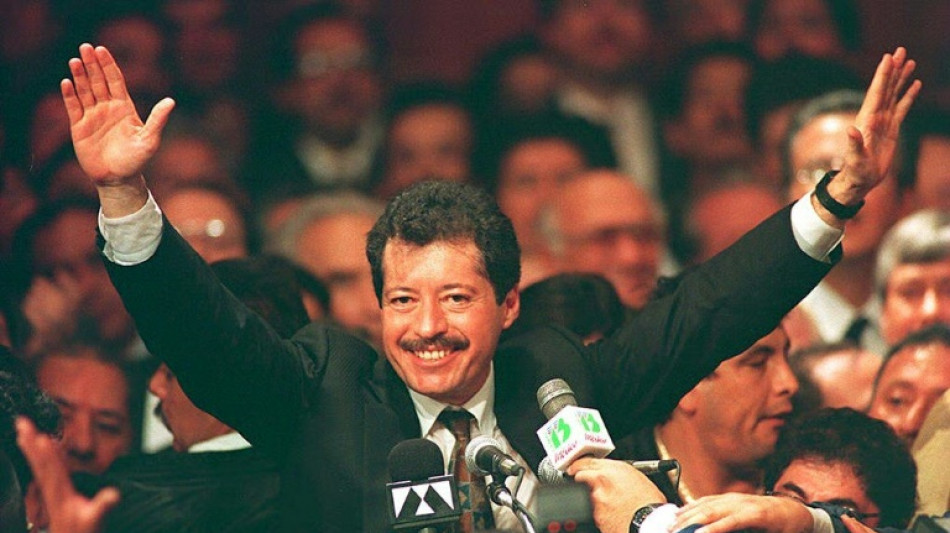

Son of slain Mexican presidential candidate forges own political path
Three decades after his father was assassinated while running for president, Luis Donaldo Colosio Riojas is himself a rising Mexican political star -- and he wants a pardon for the convicted killer.
The budding politician was just eight when his father, Luis Donaldo Colosio Murrieta, was shot in the head during a chaotic electoral rally in Tijuana, near the US border, in an attack that stunned the nation.
Once touted as a possible presidential candidate like his father, the 38-year-old ruled himself out of that race -- at least this time -- and is instead running for Senate in June elections.
Colosio Murrieta's murder on March 23, 1994 is seen as a pivotal moment in Mexican political history.
Little more than a fortnight earlier, he had delivered a speech that was interpreted as criticism of the corrupt old guard of his then-hegemonic Institutional Revolutionary Party (PRI).
"The origin of many of our evils lies in an excessive concentration of power... I see a Mexico that is hungry and thirsty for justice," he said.
As with the assassination of US President John F. Kennedy, Colosio Murrieta's murder unleashed a storm of conspiracy theories about who was behind it.
The attack was the focus of the 2019 Netflix television series "Crime Diaries: The Candidate."
Mario Aburto, now 53, is the only person imprisoned for the killing of Colosio Murrieta, who was seen as a shoo-in for president.
According to investigators, Aburto admitted to the crime and said that he acted alone.
A working class resident of Tijuana who was not known as a political activist, he was sentenced to 45 years in prison, where he remains today.
In a double tragedy, Colosio Riojas's mother died of pancreatic cancer months after the assassination.
He and his sister were adopted by their maternal aunt, who this month also lost a battle with cancer.
In a video posted on Instagram, Colosio Riojas paid an emotional tribute to the woman he called his "second mother" and who "in the worst moment of my life, saved my life."
Along with an uprising by Zapatista rebels that year, the murder shook international confidence in Mexico's stability, coming months after a landmark free trade agreement with the United States and Canada took effect.
The PRI scrambled to choose another candidate, Ernesto Zedillo, who won the presidency in 1994.
But the following election six years later brought a stunning end to seven decades of rule by a party once described by Nobel laureate Mario Vargas Llosa as a "perfect dictatorship."
- 'Name recognition' -
Colosio Riojas has enjoyed a rising political profile since 2021 when he was elected mayor of the industrial city of Monterrey, capital of the northeastern state of Nuevo Leon.
He is now seeking a seat in the Senate -- not as a representative of the PRI but for the Citizens' Movement, a center-left minority party created by former PRI members.
"Because of Colosio Jr.'s name recognition and the party's standing in Nuevo Leon, he is likely to be elected to the Senate and remain a visible figure in local and national politics," political risk advisory firm EMPRA wrote in a research note.
Colosio Riojas made headlines in January when he asked for a pardon for Aburto from President Andres Manuel Lopez Obrador, who rejected the idea.
Addressing the issue again this month, Colosio Riojas said: "I forgive that person, may God bless him, may he be free and leave Mexico, and may he allow us to heal as a nation."
Colosio Murrieta's assassination has long been considered one of Mexico's greatest mysteries.
The original lead investigator, Judge Miguel Montes, initially said that it was the result of a conspiracy.
He then reversed himself, finding that Aburto acted alone.
Decades later, the plot continues to take twists and turns.
In January, a judge threw out evidence presented by the attorney general's office against an alleged second gunman suspected of having acted with the complicity of a now-defunct government intelligence service.
These days, attacks on politicians -- particularly at the local level -- are common in Mexico due to violence linked to corruption and the multibillion-dollar narcotics trade.
Explaining his decision not to run for president, Colosio Jr. said that "the most selfish reason of all but perhaps the most important" was his children.
"They are my whole world, and they need a dad."
In 2030, when Mexico will hold another presidential election, Colosio Riojas will be 44 years old -- the same age as his father when he was killed.
M.Gutierrez--LGdM




